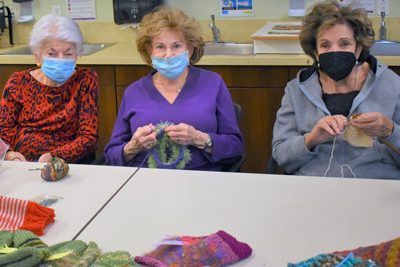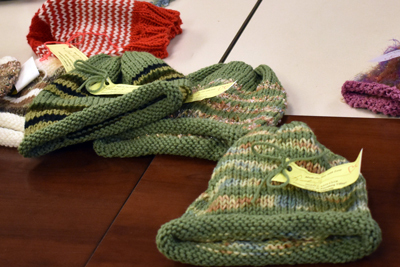Los Angeles Jewish Home Residents Stitch Compassion and Community


Los Angeles Jewish Home Residents Stitch Compassion and Community

For the ladies in the Needle Arts Group at the Los Angeles Jewish Home's Fountainview at Eisenberg Village, knitting is a powerful expression of love. Each Thursday, approximately 6-8 residents gather in the Creative Arts Center to give back to the community—and to enjoy a little 'schmoozing' along the way.
The group was formed by Fountainview at Eisenberg Village resident Reggie Scheer in 2010, originally as a gathering of experienced knitters (or those interested in learning how to get started) who would bring items they had made –baby outfits, infant hats, and sweaters—for "show and tell". Soon after the group's establishment, its members decided to focus on volunteerism, using their dexterity and style to fashion articles of clothing for people in distress and need.
As a first step, the group affiliated itself with Operation Gratitude, a high-impact nonprofit organization benefitting US military overseas. Needle Arts members knitted items for soldiers and made trips to the local armory, where they would help package goods being sent to troops abroad.
Needle Arts Group member Claire Wilen, then reached out to her daughter-in-law, Lisa Wilen, to start a relationship with UCLA Health. Lisa is Director of Operations for Hematology/Oncology in the Community Practices division for Central and Southern California. Today, the group supports UCLA patients, who may lose their hair due to chemotherapy, with handmade caps to keep them warm.
"The caps are well-received and greatly appreciated by our patients," Lisa says. "The patients are always so impressed with the quality and quantity of caps, which I distribute to our 19 oncology offices. In fact, I receive messages from our nurses when their stock is running low! What the Needle Arts Group does touches the hearts of all who benefit."

One of those beneficiaries is Susan Bruer, a patient at UCLA Oncology Center in San Luis Obispo. "I recently picked out a very attractive hat made by (Needle Arts Group member) Rose Geller," Susan says. "The hats are very attractive and are very much appreciated during chemotherapy treatment."
As Rose Geller sees it, she is doing more than just knitting a cap. "When a person is hurting and they get a handmade hat, it touches them, and they know someone cares," she says.
Claire and fellow knitter Jane Spitzer, also participate in Myra's Knitting Mavens, a group at Valley Beth Shalom synagogue in Encino. Sometimes, the Needle Arts crew coordinates volunteer efforts with the Mavens.
"One time, we got a special request to knit a cap for someone's brother who was very sick," Claire recalls. "He had requested his Oregon State school colors. I knitted the cap, which he loved, and later I learned the young man was doing much better following his treatments."
Other projects have included knitting hats for Israeli army soldiers. "We had to be careful not to make them with bright colors, so the soldiers wouldn't stand out as targets when they were on duty," recalls Needle Arts Group member Sue Richter. They also helped create blankets for children being housed in immigration centers at the US border.
The ladies in the group spend their own money to purchase yarn, but during the pandemic, they received abundant yarn donations, as many people were cleaning out their closets.
"They are incredibly grateful for all the contributions of yarn," says Annette Weinberg, campus lifestyle and enrichment director at the Jewish Home's Eisenberg Village.
For information about the Needle Arts Group, contact Annette at (818) 654-5535 or [email protected].